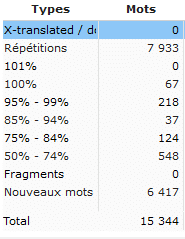For your translation projects, it is important to understand the concept of weighted word counts, which is why we’ve taken the time to write this article on the subject.
As a salesperson, I find it is easier to talk about “weighted word counts” because it is a better estimation of the time needed for a translator to complete their work. However, a number of our own translators, in fact, have difficulty understanding exactly what this means! So, below, I’ve given a few explanations, which, I hope, will allow you to have a better idea of the subject.
memoQ analysis: matches and repetitions
If you’ve already worked with TradOnline, you’ve almost certainly handled a memoQ project for us.
As with any CAT tool, memoQ is able to quantify the repeat segments in a document or project. These are what we refer to as repetitions or 100% or 100% matches.
With memoQ, we are also able to identify segments that are similar but not completely identical. These segments are given a percentage of similarity and are referred to as fuzzy matches.
As a translator, you’ve probably noticed how your translation memories grow and are enriched over time as you handle your clients’ projects, providing you with a higher number of matches in each future project.
What are the rates for repetitions?
Okay, now we’re getting down to the brass tacks!
Let’s take the standard rates for a translator who works with TradOnline, below:
| 100% – 101% matches / repetitions | 25% of translator’s standard rate |
| 95%-99% matches | 30% of translator’s standard rate |
| 85%-94% matches | 50% of translator’s standard rate |
| 75%-84% matches | 70% of translator’s standard rate |
| <75% matches | 100% of translator’s standard rate |

How to calculate weighted word counts
This leads to a simple calculation that will enable you to define the price to be paid by your clients:
(Number of 100% and 101% matches and repetitions * 25% * your price per word) + (number of 95%-99% matches * 30% * your price per word) + (number of 85%-94% matches * 50% * your price per word) + (number of 75%-84% matches * 70% * your price per word) + (number of <75% matches * 100% * your price per word) = your total rate for the project.
And, if you listened well to your maths teachers, you ought to remember you can simplify this equation by extracting the common coefficient, in this case, your price per word.
We can therefore simplify the equation as below:
Your price per word * (number of 100% and 101% matches and repetitions * 25% + number of 95%-99% matches * 30% + number of 85%-94% matches * 50% + number of 75%-84% matches * 70% + number of <75% matches * 100%) = your total rate for the project.
In other words: your price per word * the weighted word count = your total rate for the project.
So, let’s take a real world example of a project:

This word count was provided by memoQ, our CAT tool of choice at TradOnline.
If we look back to the table above, we can see it is necessary to group some of these categories in order to facilitate the equation:
100% matches + 101% matches + repetitions: 7933 + 67 = 8000
95%-99% matches: 218
85%-94% matches: 37
75%-84% matches: 124
50%-74% matches + new words: 548 + 6417 = 6965
The weighted word count (in percentage) that I’m going to give you corresponds to time saved for the translator by using the translation memory and/or by using a CAT tool to manage repetitions within a document or the project.
In order to solve for the weighted word count, below is the equation (note that for these equations 25%=0.25, 30%=0.3, etc):
(8000*0.25) + (218*0.3) + (37*0.5) + (124*0.7) + (6965*1) = 9135.7 weighted words
Thus, to calculate your wage for the project, all you have to do is multiply this weighted word count by your price per word.
So, when your project manager offers to pay you the weighted word count, this isn’t a scheme to scam you! Take the time to verify the weighted word count table that is being used.
If you have your own CAT tool, you can easily replicate the calculation yourself, either by using the standard table or by using your own specific table.
Personally, I find it is a good method for determining how much time you ought to plan for to complete your project. Generally speaking, the weighted word count will give you that time if you divide it by your hourly production. For example, you average around 300 words per hour, therefore, you can calculate that this project will take you approximately 30.5 hours (9135.7/300= 30.45).
If you still have questions about weighted word counts, feel free to reach out to us, we’ll be happy to help clarify it in any way we can!

